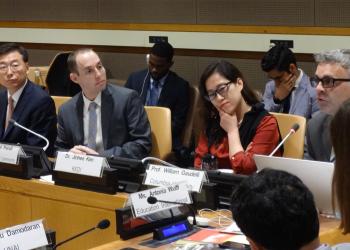UN seminar stresses need for global citizenship education
Education for global citizenship may not seem like the most urgent issue in the world, but it could very well be one of the most important.
That was the consensus at a seminar on 15 June 2015 that brought together diplomats, UN officials and civil society to consider how the promotion of global citizenship can help create the kind of peaceful world envisioned by the UN Charter – and the more sustainable one outlined in the post-2015 development agenda.
“Given the strong need to tackle global challenges, such as violent extremism, global citizenship education shares the importance of a common understanding of universal values, such as justice, human rights and dignity, gender equality, and cultural diversity,” said Ambassador Oh Joon of the Republic of Korea to the UN.
“It is probably one of the best things we can do for the future of humanity,” said Ambassador Oh.
His country’s mission – along with UN missions of France, Nigeria, Qatar, and the United States, organized the meeting. It was co-sponsored by seven NGOs, including the Baha’i International Community, and several UN organizations, including UNESCO.
The three-hour event, which is archived on UN Web TV, featured a range of panelists, including diplomats from the sponsoring countries, representatives of civil society, and educational experts.
Panelists said education is the key to development generally – and that education for global citizenship moreover offers an all-important system of values that can ensure education is put to good use.
Several speakers, for example, noted that education alone does not ensure peace and development.
“The masterminds of terrorism are educated,” said Usman Sarki, deputy permanent representative of Nigeria’s mission to the UN. “Education should be something that develops the character of people.”
Francois Gave of France’s UN mission said that mere consciousness of the fact that we live in a “global village” does not ensure peace – and that some type of values-oriented education is also needed.
“A global village, even if it is a reality in some ways, does not mean global friendship,” said Mr. Gave. “We need something else.”
Richard Erdman, acting representative to ECOSOC of the USA’s mission to the UN, said the world needs an “educational ecosystem” that instills the values of “hard work, tolerance, good citizenship, human rights, moral responsibility, and environmental stewardship.”
“These are the values that hold our diverse society together,” said Ambassador Erdman. “They are the building blocks for building a more peaceful global community.”
The idea of education for global citizenship has taken on increased prominence because of its inclusion in the proposed Sustainable Development Goals (SDGs), which call for learners everywhere to “acquire knowledge and skills needed to promote sustainable development” including the promotion of “global citizenship.”
In addition, UN Secretary-General Ban Ki-moon in 2012 launched the Global Education First Initiative (GEFI), which seeks to spur renewed efforts to reach global education goals.
Yousef Sultan Laram, deputy permanent representative of Qatar to the UN, said a renewed understanding of the importance of the right to education should go hand-in-hand with the new stress on education for global citizenship.
“The right to education is among the most widely recognized rights,” said Mr. Laram. “With this in mind, the question remains: How can we ensure the right to education is central in the post-2015 development agenda? How can we improve national legislation so it clearly describes governments’ obligations to provide high quality education without discrimination?”
“Education is at the core of comprehensive and sustainable development and it is an imperative, vital instrument for peaceful coexistence,” said Mr. Laram.
Daniel Perell, a representative of the Baha’i International Community to the UN, said that education for global citizenship is not merely a practical step that can be taken to advance peace and development.
“It is also relevant at the global and national level as an ethical, moral, and, for many, a spiritual reality,” said Mr. Perell. “And we have to learn how to tap into that.”
He said, for example, his faith views it as a spiritual reality, noting that the Baha’i sacred writings state: “The earth is but one country, and mankind its citizens.”
Mr. Perell moderated a second panel during the seminar that featured UN officials, academics and representatives of civil society in an effort to explore various models for global citizenship education.
That panel included the participation of Ramu Damodaran of the United Nations Academic Impact Secretariat; Jinhee Kim of the Korea Educational Development Institute; Jordi Torrent of the United Nations Alliance of Civilizations; William Gaudelli, a professor at Columbia University; Rilli Lapalainen of the European NGO confederation for relief and development (CONCORD); Ramesh Jaura, director general of the Inter Press Service News Agency; Sofia Garcia‐Garcia of SOS Children’s Villages; and Neelam Chowdhary of the Asia Society.
